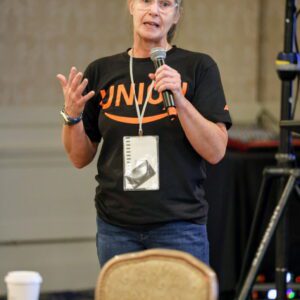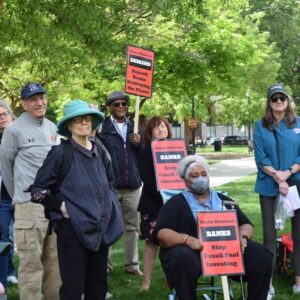March 4, 2005
Pat Salmon & Sons Cuts Off APWU Members’ Healthcare Benefits
Hundreds of private-sector mail-haul drivers and their families had their eligibility for health insurance cut off earlier this week by Pat Salmon & Sons as a collective bargaining agreement lapsed.
The drivers, who work out of terminals in Arkansas, Texas, and three other states, had been paying as much as $11,500 a year just to be eligible for the company plan. APWU representatives said that many contractual items had been agreed upon, with talks covering a deal for the 700 employees held as recently as Feb. 28.
But the company refused to consider maintaining the insurance plan, for which it was paying less than 10 percent of the premiums for family coverage, and nothing at all for individuals.
“I had been paying over $300 a month,” said Kathy Herron, a Salmon & Son’s driver based in Dallas. “But the cheapest plan I’ve been able to find just for myself costs more than three times that – and I’m in good health.”
The APWU was not seeking an increase in Salmon’s share of the healthcare costs, just that it continue to offer the plan. President of the union local that represents many company drivers, Herron has been trying to help find alternative coverage for co-workers for whom health insurance coverage is especially critical.
Herron described the situation of her colleague Sarah Willoughby, a five-year Salmon employee who was diagnosed with cancer nearly two years ago. “She’s been on chemotherapy for the past three or four months,” Herron said. “With her insurance cancelled, she’s no longer eligible for a life-saving treatment.”
Another driver, Charles Bryson, a six-year Salmon veteran, lost a kidney to cancer and was receiving follow-up treatment under the company plan. “He has to be in remission for five years before any insurer will consider him,” Herron said. “I’ve looked all over – it’s just not available.”
“The company doesn’t seem to think about or care about its workers and their families,” said a veteran Salmon & Sons employee. “I can’t even afford the medication I need to be able to operate a commercial motor vehicle. I’ve been a good driver and now I don’t know what I’m going to do.”
A driver out of Little Rock said that medical personnel attribute his high blood pressure to his sitting for long periods of time while on the job. “I’ve given one-fourth of my life to the company and now they’re taking my health care away from me. I’m being forced to change jobs – I have to go to work somewhere else,” said the employee, who requested anonymity. “I don’t understand how a company can do this to its drivers.”
“They are demonstrating some remarkable insensitivity,” said Bill Manley, Support Services Divison NBA and lead representative for the APWU bargaining team. “It clearly isn’t about the money. The company has not complained about costs; it simply doesn’t want to talk about healthcare problems.”
Salmon & Sons driver Sidney Brent has an extremely rare problem, hidradenitis, a painful and debilitating disease of the sweat glands. A 10-year driver for the company, the Dallas-based Brent is on short-term disability and, while on the health plan, was able to receive the services of a visiting nurse, mainly to help with pain treatment. Not only has the nursing care been cut off, surgery scheduled for mid-March has been indefinitely postponed.
Another uninsurable from the Dallas-Fort Worth area is Jerry Tigert, a nearly 20-year veteran of Pat Salmon & Sons. He has had numerous diabetes-related health problems through the years, but has always been able to “afford” his challenges. Driver Tammy Nichols also is challenged by diabetes. Although Nichols, of Little Rock, is in good health, a daughter she supports with her Salmon wages is diabetic and suddenly ineligible for the level of necessary care she had been receiving.
“The company has always been almost entirely dependent upon the Postal Service for its livelihood, and it’s been doing very well for more than 50 years,” Manley said. “Unlike the Postal Service, however, Pat Salmon & Sons doesn’t want to show that it cares for its employees’ well-being.”
APWU representatives say there were only a few major issues outstanding in the contract talks. In addition to cutting off health insurance, the company proposed eliminating the grievance procedure for any type of discipline resulting from accidents – a direct attack on the concept of “just cause,” and a way to make it easy to take away the job of anyone, regardless of their work or driving record.
The company likewise has unilaterally rescinded a long-time traditional benefit known as “Safety Day,” under which drivers who maintained excellent driving records were able to earn extra leave.
Nearly all of Pat Salmon & Sons business involves long-distance hauling of U.S. mail. “The Postal Service offers health insurance to all its employees,” Manley said. “And in contrast to the way the USPS treats its workers, Salmon drivers do not receive any paid personal days or sick days.” Paid leave is also on the bargaining table, Manley said. “But wages are not in dispute here.”
The drivers won their first labor contract in September 2003, following three years of negotiations, the filing of unfair labor practice charges, and a short but successful strike. The agreement covered Salmon employees at terminals in Dallas, Fort Worth, Little Rock, Oklahoma City, Tulsa, Memphis and Shreveport. These employees currently are voting by a secret mail ballot on whether or not to strike.
The APWU also represents hundreds of drivers at Mail Contractors of America, another large Postal Service vendor, whose headquarters is in Little Rock. MCA drivers, who also are working without a contract, have health insurance, but MCA – which used to pay about half of the premium – no longer pays anything toward healthcare costs.
MCA workers voted overwhelmingly to reject MCA’s final offer and have also voted to strike, although a strike date has not been set.



